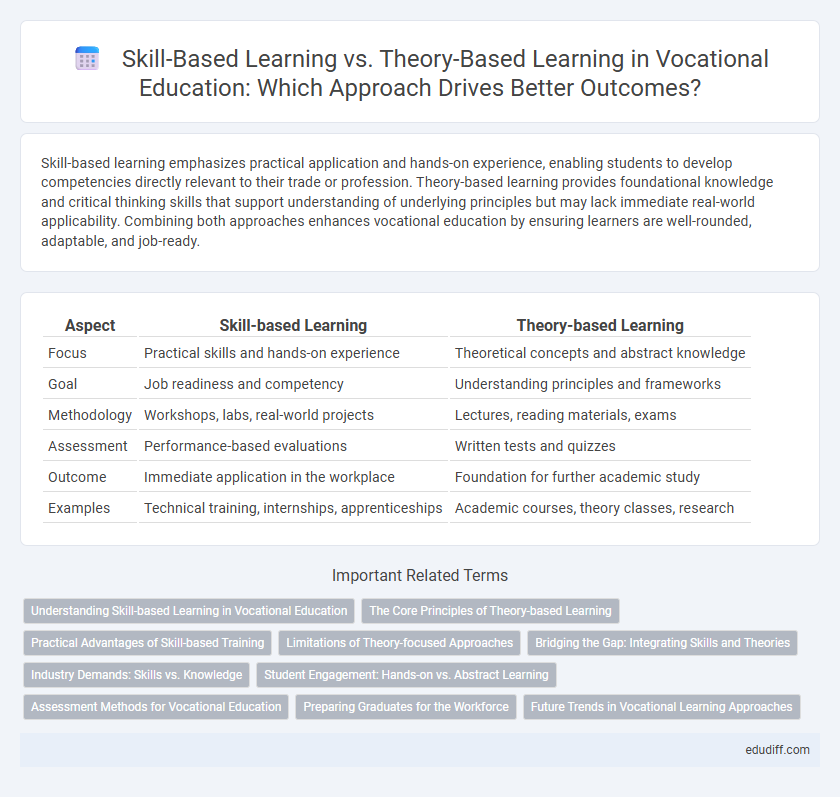Skill-based learning emphasizes practical application and hands-on experience, enabling students to develop competencies directly relevant to their trade or profession. Theory-based learning provides foundational knowledge and critical thinking skills that support understanding of underlying principles but may lack immediate real-world applicability. Combining both approaches enhances vocational education by ensuring learners are well-rounded, adaptable, and job-ready.
Table of Comparison
| Aspect | Skill-based Learning | Theory-based Learning |
|---|---|---|
| Focus | Practical skills and hands-on experience | Theoretical concepts and abstract knowledge |
| Goal | Job readiness and competency | Understanding principles and frameworks |
| Methodology | Workshops, labs, real-world projects | Lectures, reading materials, exams |
| Assessment | Performance-based evaluations | Written tests and quizzes |
| Outcome | Immediate application in the workplace | Foundation for further academic study |
| Examples | Technical training, internships, apprenticeships | Academic courses, theory classes, research |
Understanding Skill-based Learning in Vocational Education
Skill-based learning in vocational education emphasizes practical application and mastery of specific tasks required in the workforce, enhancing job readiness and hands-on competence. This approach integrates real-world scenarios and experiential training, allowing learners to develop technical proficiency and problem-solving abilities essential for skilled trades. By focusing on skill acquisition over theoretical knowledge, vocational programs align education with industry demands, improving employability and productivity.
The Core Principles of Theory-based Learning
Theory-based learning centers on understanding fundamental concepts, principles, and frameworks that form the foundation of a discipline. It emphasizes cognitive skills such as critical thinking, problem-solving, and abstract reasoning through structured content and systematic study. This approach fosters deep comprehension, enabling learners to apply knowledge flexibly across various contexts, making it essential in vocational education for conceptual mastery.
Practical Advantages of Skill-based Training
Skill-based learning enhances employability by providing hands-on experience directly applicable to industry demands, fostering quicker adaptation to workplace challenges. This approach improves problem-solving abilities through real-world practice, leading to higher competence and confidence in performing job tasks. Employers prioritize candidates with practical skills, as these learners demonstrate immediate productivity and reduced training time on the job.
Limitations of Theory-focused Approaches
Theory-based learning often lacks practical application, leading to limited skill retention and reduced job readiness. Theoretical knowledge alone can result in difficulty adapting to real-world workplace challenges and decreased problem-solving capabilities. This approach may also hinder hands-on experience crucial for mastery in vocational fields.
Bridging the Gap: Integrating Skills and Theories
Bridging the gap between skill-based learning and theory-based learning enhances vocational training effectiveness by combining practical application with foundational knowledge. Integrating hands-on experience with theoretical concepts enables learners to develop critical thinking and problem-solving skills essential for real-world job performance. This holistic approach fosters adaptability and competence, preparing individuals to meet industry demands with both technical proficiency and intellectual understanding.
Industry Demands: Skills vs. Knowledge
Skill-based learning directly addresses industry demands by equipping students with practical abilities that enhance job readiness and meet current market needs. Theory-based learning emphasizes foundational knowledge essential for understanding concepts but may lack immediate applicability in fast-evolving work environments. Employers increasingly prioritize candidates with hands-on experience and technical skills that can be applied to real-world challenges over purely theoretical expertise.
Student Engagement: Hands-on vs. Abstract Learning
Skill-based learning enhances student engagement through hands-on activities that foster practical understanding and real-world application, making concepts tangible and memorable. Theory-based learning often involves abstract concepts that may challenge students' attention and motivation due to the lack of immediate real-life relevance. Engaging students in skill-based learning environments encourages active participation, collaboration, and experiential problem-solving, leading to deeper comprehension and retention.
Assessment Methods for Vocational Education
Skill-based learning in vocational education emphasizes practical assessments such as hands-on tasks, simulations, and real-world projects to measure competence directly in job-related skills. Theory-based learning relies predominantly on written exams, multiple-choice tests, and oral evaluations to assess knowledge and conceptual understanding. Effective vocational assessment integrates both methods, ensuring students demonstrate theoretical understanding alongside practical proficiency critical for workforce readiness.
Preparing Graduates for the Workforce
Skill-based learning equips graduates with practical, hands-on experience directly applicable to workplace tasks, accelerating job readiness and reducing onboarding time. Theory-based learning provides foundational knowledge and critical thinking skills essential for adapting to diverse professional challenges and long-term career growth. Combining both approaches enhances employability by balancing immediate technical proficiency with intellectual versatility.
Future Trends in Vocational Learning Approaches
Skill-based learning increasingly dominates vocational education as automation and technology demand practical expertise. Integration of virtual reality and AI-driven simulations enhances hands-on training, bridging the gap between theoretical knowledge and real-world application. Future trends emphasize personalized, adaptive learning paths that align with evolving industry standards and job market needs.
Skill-based Learning vs Theory-based Learning Infographic

 edudiff.com
edudiff.com